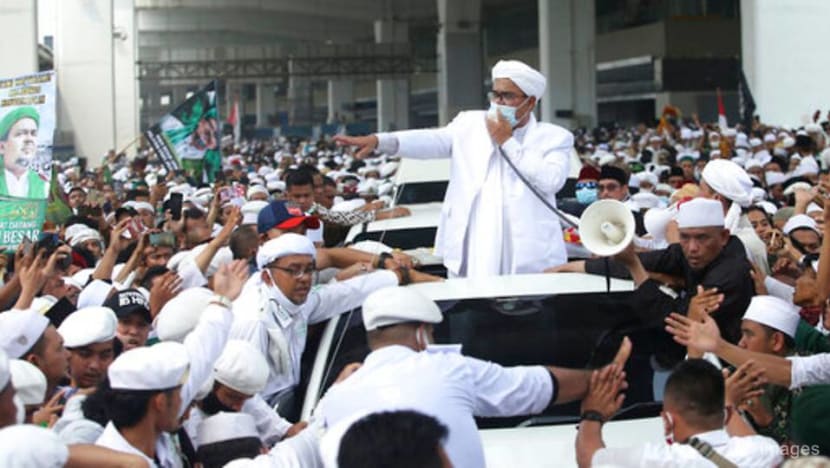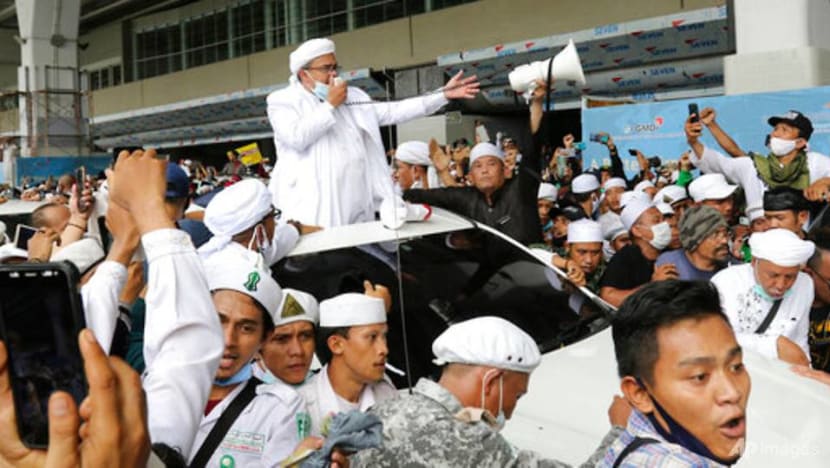Firebrand Indonesian cleric returns from 3-year Saudi exile

Indonesian Islamic cleric and the leader of Islamic Defenders Front Rizieq Shihab speaks to his followers upon arrival from Saudi Arabia at Soekarno-Hatta International Airport in Tangerang, Indonesia, Nov 10, 2020. (Photo: AP)
JAKARTA: Thousands of followers of a firebrand cleric joyfully welcomed him at an Indonesian airport early on Tuesday (Nov 10) as he returned home from a three-year exile in Saudi Arabia after criminal charges including a pornography case were dropped.
The supporters, waving welcoming banners and placards, burst into joy when they saw Rizieq Shihab, leader of the Islamic Defenders Front, and his family exit immigration at the airport heading to their residence in central Jakarta.
Television footage showed thousands of men, women and children, many wearing white Islamic robes, chanting "God is Great" as they marched and filled a major road to the airport's arrival gates. They halted traffic along the way to the airport.
"We did not mobilise them to come, they came voluntarily because they had long missed their beloved leader,s Front spokesman Slamet Ma'arif told TVone. He urged Shihab's followers to welcome their leader in an orderly manner and comply with health protocols amid the coronavirus pandemic.
Many of them spent the night in the airport waiting and praying before Shihab's arrival, airport spokesperson Haerul Anwar said. Authorities had beefed up security at Soekarno-Hatta airport by deploying more than 1,500 security personnel, including police and military, he said.

Shihab left Indonesia in 2017 to go on an umrah, or minor pilgrimage, to Mecca shortly after the National Police charged him in connection with a pornography chat case and for allegedly insulting the Pancasila state ideology.
Police dropped both charges last year due to weak evidence, but authorities in Saudi Arabia had banned him from leaving the country without any explanation.
READ: Indonesian Muslims protest France's defence of cartoon
Coordinating Political, Legal and Security Affairs Minister Muhammad Mahfud said last week the Indonesian government was not preventing Shihab from coming home.
"We've never stopped him from going home, if he was impeded, it is his business with the Saudi Arabian government," Mahfud told reporters in response to an address by Shihab on the Front's official YouTube channel in which the cleric announced his imminent return.
Agus Maftuh Abegebriel, Indonesia's ambassador to Saudi Arabia, said Shihab was given a visa to leave Saudi Arabia this month for Indonesian citizens who undergo a deportation process.
The front was once on the political fringes and has a long record of vandalising nightspots, hurling stones at Western embassies and attacking rival religious groups. It wants Shariah law to apply to Indonesia's 230 million Muslims.
READ: Indonesian president warns not to rush vaccines amid halal concern
The group has gained significant influence through humanitarian and charity work. It was a key organiser of massive street protests in 2016 and 2017 against the governor of Jakarta, who was subsequently imprisoned for blasphemy.
Indonesia is the world's most populous Muslim country, but has a secular government and a reputation as a tolerant, pluralist society that respects freedom of expression. Most Indonesians practice a moderate form of Islam, but a small extremist fringe has become more vocal in recent years.
In an interview with the Associated Press last year, President Joko Widodo said he would try to work with Muslim groups as long as their views do not violate Indonesia's founding principles that include a secular government and tolerance of several officially recognised religions.
"If an organisation endangers the nation in its ideology I won't compromise," he said.
Widodo in 2017 banned Hizbut Tahrir Indonesia, a smaller group than the Islamic Defenders Front that campaigned for a global caliphate.












